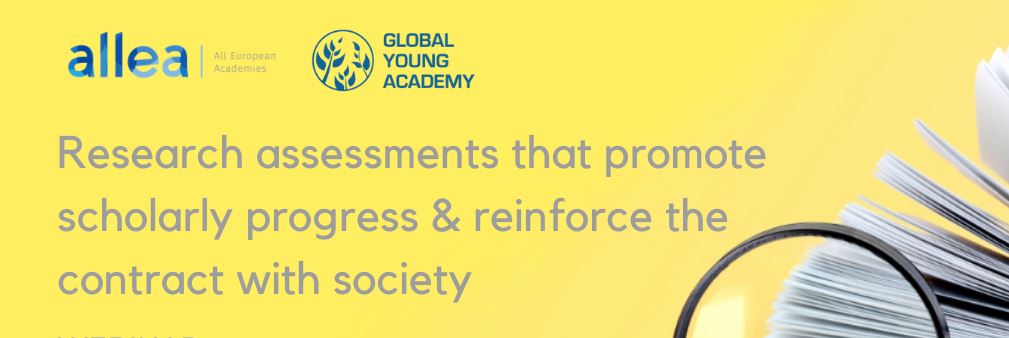In November 2020, GYA alumni Boon Han Lim (Tunku Abdul Rahman University, Malaysia) and Martin Dominik (University of St Andrews, UK) as members of the GYA working group on Scientific Excellence, together with ALLEA, jointly organised an online workshop entitled “Research assessments that promote scholarly progress and reinforce the contract with society”.
A workshop report has now been published: LINK
You can watch the original event here:
The event raised key questions about the purpose and goals of research assessments. A presentation by Ellen Hazelkorn (BH Associates educational consultants) set the scene, in which she outlined the role of science, its framing by an accountability agenda, competitiveness pressure vs enhancing capacity, rising inequalities, international collaboration, science literacy, and the impact on trust, arguing the case for a holistic engagement between universities and society. This was followed by brief interventions from Kostas Glinos (European Commission), Michael Hill (DORA Steering Committee) and GYA alumnus Martin Dominik.
Kostas emphasised that science must not be considered elitist and needs to be responsible to society. Michael mentioned that too many publications of low quality pose a problem, we face a gap in adequately communicating science, and that researchers should take back control through the Open Science movement, also addressing unhealthy hierarchic structures. Martin raised various points such as diversity being a key asset of our society, the need to look at research as process, the role of interactions between researchers and specific context, responsible management and empowered actors, ethical leadership and trust, as well as the meaninglessness of universal rankings and the harmfulness of ill-conceived assessment, and finally stressed that equitable sharing of benefits is a major challenge for an open science global ecosystem.
In a subsequent discussion round on audience questions, moderated by Roger Pfister (ALLEA), it was moreover brought up that, as reflected in the Hong Kong Principles, rigour and integrity are decisive and critical qualities defining the value of research, while societal relevance stretches beyond addressing immediate needs given that innovation frequently stems from unexpected outcomes. Moreover, evaluation pressure and driving by incentives can be counterproductive, whereas initiative needs support.
The debate provided much food for thought on framing the issue, but it requires to be followed up with efforts on developing concrete policies and putting them into place.
Workshop report: LINK
